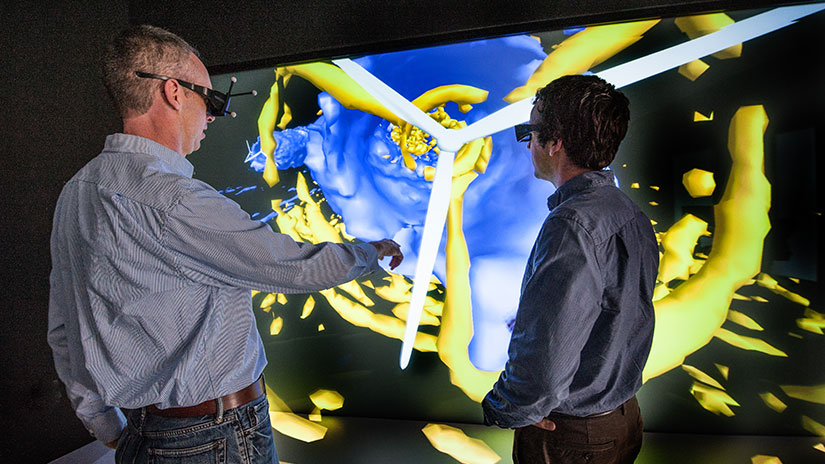Atmospheric Science and Energy Generation
NLR's technical experts are improving weather prediction models and resource assessments to optimize energy generation.

Physical processes in the atmosphere, such as wind and wakes, have been studied for thousands of years. These atmospheric processes create and control the fuel that drives energy demand as well as several energy technologies. NLR researchers study the atmosphere to assess and measure the nation's wind resources, develop accurate and high-resolution models, and identify the most effective technologies for harnessing abundant energy sources. By improving remote-sensing technologies, turbulence-resolving atmospheric simulations, wind maps, and validation techniques, NLR's work provides benefits across sectors.
Capabilities
Resource Evaluation and Site Characterization
NLR scientists are leading efforts to evaluate potential for energy generation across the United States by harnessing the nation's abundant wind through resource assessments, remote sensing, and forecasting with computer models.
Capabilities include:
- Wind resource assessments
- Mesoscale numerical weather predictions
- Turbulence-resolving atmospheric simulations
- Remote-sensing technologies
- Machine learning and artificial intelligence.
Global Weather, Mesoscale Forecasts, and Plant-Level Effects
NLR researchers develop numerical models to predict global and mesoscale weather forecasts. Large eddy simulations depict microscale effects and high-fidelity and high-performance computing show the effects of a range of atmospheric conditions and scales. By improving our understanding of air flow through wind power plants, we can develop new technology designs (such as airfoils) and operational strategies (such as yaw or wake controls) that improve performance and reduce costs of operations and maintenance.
Capabilities include:
- Numerical weather prediction modeling for global and mesoscales
- Large-eddy simulations for microscale effects
- Flow modeling for technology performance and controls.
Maps and Visualizations
NLR's maps and data visualizations illustrate large and complex data sets to communicate the technological capabilities of the laboratory. Our team specializes in turning data into stories, helping partners plan energy production by determining the wind resource potential for a specific site, analyzing data, and more.
Capabilities include:
- Developing maps, models, applications, and visualizations
- Supporting energy planning and production.
High-Fidelity Modeling and Validation
Using our high-performance-computing capabilities, NLR's high- and mid-fidelity predictive simulations are designed to create a deeper understanding of complex flow physics and turbine dynamics.
Capabilities include:
- High- and mid-fidelity modeling of fluids and structures
- High-performance computing
- Validation, predictive modeling, and simulation
- Software engineering for open-source community codes.
Projects
NLR's Aerodynamics of Large Turbines project is driving knowledge of aerodynamics of large turbines higher by providing up to $6.25 million to industry and academia to generate scientific data that can enable the design and development of cost-effective, high-performance large commercial wind turbines.
The Ensuring Data Usage from the Rotor Aerodynamics, Aeroelastics, and Wake and The American WAKE experimENt project focuses on using observational data from wind farms to validate wind power plant models and advance the industry's understanding of how a wind farm operates. The data, gathered from an international, multi-institutional field campaign, is helping answer the most pressing science questions about how individual wind turbines interact with one another and the atmosphere in a wind farm.
An NLR assessment project provides a quantified update on wind energy potential and spatial characteristics along the coastlines and Great Lakes of the contiguous United States by updating the assumptions used to characterize technical potential, including wind turbine and plant spatial siting constraints, assumptions on turbine and plant density, and geographic and geologic constraints.
Through WindWatts, a multilaboratory project with collaborators across the government, industry, and academia, researchers are developing a simple tool local decision makers and landowners can use to create cost-effective and accurate wind resource assessments. These assessments can then be used to make informed decisions when considering the potential to integrate wind energy into the electric supply or make a profit by selling energy generated.
Resources and Tools
Energy Research and Forecasting (GitHub)
ExaWind Multi-Fidelity Modeling Capability for Wind Turbines and Wind Farms (GitHub)
FLOw Redirection and Induction in Steady State (FLORIS) Wind Plant Optimization Tool
OpenFAST Wind Turbine Simulation Tool
WindWatts for Distributed Resources
Explore all of NLR's wind energy facilities and data and tools.
View all wind publications.
Partner With Us
Learn more about how to work with us.
Contact
Share
Last Updated Dec. 5, 2025
